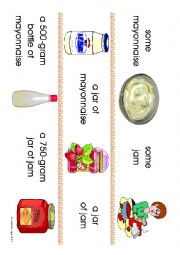
|
Countable Uncountable and Containers flash cards 25-30 of many.
Have you ever taught countables and uncountables in English only and then tried showing students how we can move from uncountable to countable using containers and then numbers (noun-adjectives)?
Use with the container flash cards to show how we count the containers but often not the contents.
Level: elementary
Age: 6-14
Type: flash-card
Downloads: 65
|
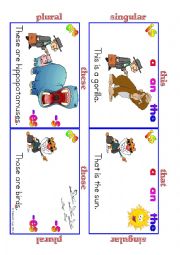
|
Demonstrative Pronoun Poster
I was looking online for demonstrative pronoun flash cards, but their is not much of value out there. This one is more of a reference card for children to use when using demonstrative pronouns in speaking or writing activities. I�ll probably make some flash cards/activity cards to go with this at a later date.
Level: elementary
Age: 6-14
Type: flash-card
Downloads: 103
|
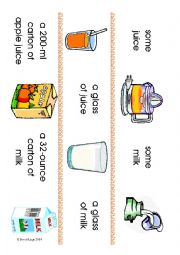
|
Countable Uncountable and Containers flash cards 19-24 of many.
Have you ever taught countables and uncountables in English only and then tried showing students how we can move from uncountable to countable using containers and then numbers (noun-adjectives)?
These will help students distinguish between How much? and How many?
Level: elementary
Age: 6-14
Type: flash-card
Downloads: 91
|
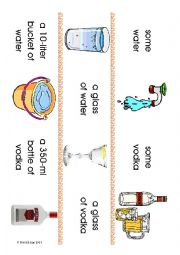
|
Countable Uncountable and Containers flash cards 13-18 of many.
Have you ever taught countables and uncountables in English only and then tried showing students how we can move from uncountable to countable using containers and then numbers (noun-adjectives)?
Use with the container flash cards to show how we count the contains but often not the contents.
Level: elementary
Age: 6-14
Type: flash-card
Downloads: 93
|
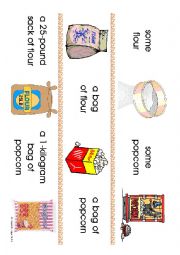
|
Countable Uncountable and Containers flash cards 7-12 of many.
Have you ever taught countables and uncountables in English only and then tried showing students how we can move from uncountable to countable using containers and then numbers (noun-adjectives)? Use these cards for pair work.
What do you want?
I want some flour.
How much flour do you want?
I want a 25 pound bag of flour.
Level: elementary
Age: 6-14
Type: flash-card
Downloads: 76
|
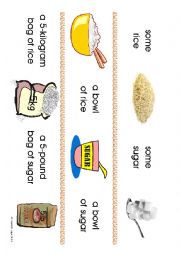
|
Countable Uncountable and Containers flash cards 1-6 of many.
Have you ever taught countables and uncountables in English only and then tried showing students how we can move from uncountable to countable using containers and then numbers (noun-adjectives)?
Maybe you�re a far better teacher than I, as I often end up with blank faces. Perhaps cards such as these will help teachers teach and students unders...
Level: elementary
Age: 6-14
Type: flash-card
Downloads: 72
|
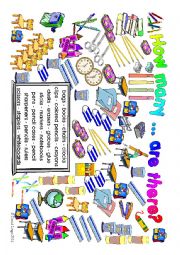
|
How many ... are there?: Classroom Supplies
Here is something which practices "There is" and "There are".
T. "How many clocks are there?"
Ss. Two!
T. Yes, that�s right. There are two clocks.
And we build it up from here, I imagine.
Level: elementary
Age: 4-12
Type: activity-card
Downloads: 247
|
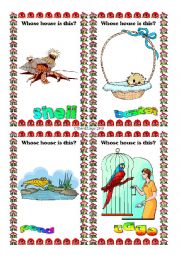
|
Animal Homes Flashcards 9-16 of 16
Some flashcards for practicing the possessive s with whose.
"Whose house (cage) is this?"
"It�s the parrot house (cage)."
These cards can also be used like this:
"Where does the kitten live?"
"It lives in a cage?"
Use them for written and spoken work.
Level: elementary
Age: 4-12
Type: flash-card
Downloads: 101
|
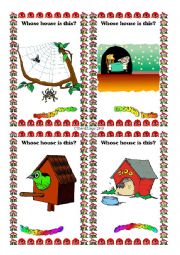
|
Animal Homes Flashcards 1-8 of 16
Some flashcards for practicing the possessive s with whose.
"Whose house is this?"
"It�s the spider�s house."
These cards can also be used like this:
"Where does the spider live?"
"It lives in a spiderweb?"
Use them for written and spoken work.
Level: elementary
Age: 4-12
Type: flash-card
Downloads: 99
|
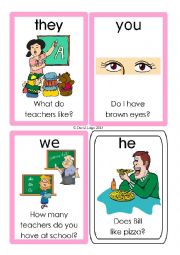
|
Pronoun Flashcards: 61-70 of 70 plus special switchit cards
Aside from more cards I have included the special "Switchit" cards you need for playing the game. I usually play with 10 of these cards. You will also find more suggestions on ways of using the resource.
Level: elementary
Age: 7-15
Type: flash-card
Downloads: 110
|